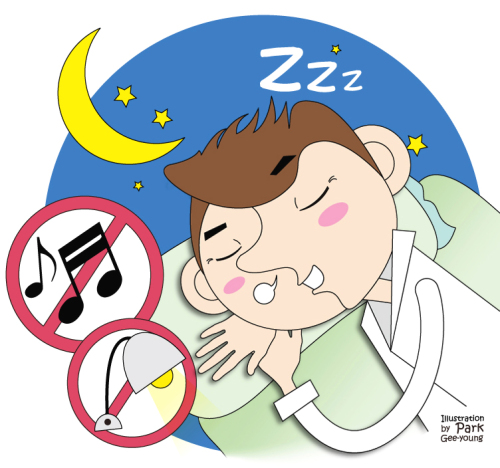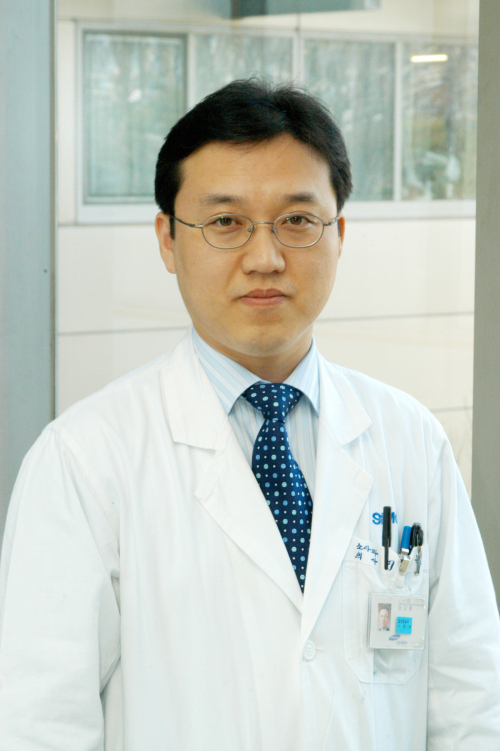
“Boys and girls, it’s time to go to bed.”
When I was a boy, everyday this message came from the television or radio just before 9 p.m.
I thought of it as a signal for the end of the day and would go to bed. I knew nothing about the world after that time. The 9 to 6 sleep schedule was considered the best sleeping habit at that time.
I’m a pediatric neurologist. I deal with epilepsy, muscle disease, developmental problems and other neurologic diseases. I am very busy with numerous patients especially during the summer vacation.
“Do the neurologic diseases increase in summer?”
“Mm, No!”
The truth is that patients with headaches usually visit the neurology clinic during vacation because they do not have enough time during the semester.
Headaches may be a migraine or tension type, and are rarely associated with other causes. Most of the patients who complain of severe headache have sleep problems or bad sleeping habits regardless of the diagnosis.
In Korea, sleep is regarded as an enemy of study or work. A person who gets enough sleep tends to be called a lazy. Even some toddlers aged 3-4 go to bed after 11 p.m. Adult dramas which usually begin at 10 p.m. are very popular among school children. High school students usually get 5-6 hours of sleep daily because of afterschool class which ends late night or videogames.
Sleep is an essential component of daily living.
If sleep is not sufficient, what symptoms may appear?
A five-year-old boy once visited my clinic, complaining of headache. Surprisingly he had no headache in half the year, but did have severe symptoms during the remaining half of the year. His family had spent six months in the U.S. (no headache) and the rest in Seoul.
The answer to the cause of his headache lay in that he usually went to bed at 8:30 p.m. in the U.S. but after midnight in Seoul because his parents came home so late.
The sole remedy that I prescribed was “sleep hygiene.”
“Sleep hygiene” is a medical term. If we do not wash our hands after defecation or drink dirty water, we certainly fall ill. Sleep hygiene is like that. If we do not keep sleep hygiene, we surely suffer problems; headache, general ache, mood disorder, personality change (irritable, quick tempered), easy fatigability, indigestion, memory loss, difficulty concentrating, and so on.
So, the following are recommended for children and adolescents.
Keep a regular sleep schedule.
1) The earlier the better; for the preschool and elementary school age kids, 9 p.m. will be the best bed time. If they sleep too late, stress hormones will interfere with their sleep.
2) Wake up at the same time every day, even when you have a late night.
3) Take a stroll for about 15 minutes after waking up. Enjoy sunlight.
4) If you are too tired in daytime, take 15-20 minutes for a nap.
5) Taking a nap for more than half an hour is not good for your night sleep.
6) Before going to bed, refrain from looking at bright screens, smart phones or electronic gadgets. Don’t listen to music either.
In Korea, there’s a saying: “Sleep is boyak (herbal medicine)”
It is true: Sound sleep will keep you healthy.

By Lee Ji-hoon
The author is an assistant professor at the Department of Pediatric Neurology of Samsung Medical Center. ― Ed.



![[AtoZ into Korean mind] Humor in Korea: Navigating the line between what's funny and not](http://res.heraldm.com/phpwas/restmb_idxmake.php?idx=644&simg=/content/image/2024/04/22/20240422050642_0.jpg&u=)



![[Herald Interview] Why Toss invited hackers to penetrate its system](http://res.heraldm.com/phpwas/restmb_idxmake.php?idx=644&simg=/content/image/2024/04/22/20240422050569_0.jpg&u=20240422150649)

![[Graphic News] 77% of young Koreans still financially dependent](http://res.heraldm.com/phpwas/restmb_idxmake.php?idx=644&simg=/content/image/2024/04/22/20240422050762_0.gif&u=)





![[Exclusive] Korean military to ban iPhones over security issues](http://res.heraldm.com/phpwas/restmb_idxmake.php?idx=652&simg=/content/image/2024/04/23/20240423050599_0.jpg&u=)



